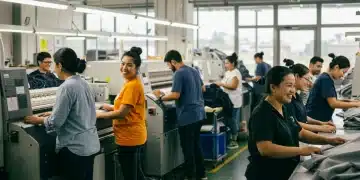UFLPA Enforcement on Fast-Fashion Imports: Challenges and Industry Impact

The UFLPA enforcement on fast-fashion imports is reshaping the fashion industry, demanding greater transparency and ethical sourcing from brands.
As consumer awareness rises, companies must adapt to stay compliant and meet the evolving expectations of the market.
With the enforcement of these regulations intensifying, businesses are facing a growing pressure to ensure their supply chains align with ethical standards. Understanding these requirements is no longer optional; it’s essential for success in the fast-fashion sector.
As we approach 2025, it’s clear that the landscape is changing. Let’s explore how UFLPA enforcement is impacting fast-fashion imports and what you need to do to stay ahead.
Understanding UFLPA and its implications
The UFLPA enforcement on fast-fashion imports has significant implications for businesses involved in global sourcing, particularly when it comes to the supply chain.
The Uyghur Forced Labor Prevention Act (UFLPA) aims to prohibit goods made with forced labor from Xinjiang, China, entering the U.S. market.
This legislation specifically targets industries that rely on low-cost labor, with fast fashion being one of the primary sectors affected. To avoid penalties and disruptions in trade, companies must understand the law’s requirements and adapt their practices accordingly.
The UFLPA mandates that companies can no longer ignore ethical sourcing in their supply chains. As the enforcement of this act tightens, businesses are tasked with proving that their products are free from forced labor, especially in regions with reported human rights violations.
Compliance with UFLPA is not just about avoiding legal risks; it’s about maintaining brand integrity and appealing to increasingly conscious consumers who demand transparency.
Companies must now evaluate their entire production process to ensure that they aren’t inadvertently contributing to forced labor practices.
Key Goals of UFLPA
The primary goals of the UFLPA enforcement on fast-fashion imports center around human rights, ethical sourcing, and enhancing supply chain transparency.
At its core, the UFLPA demands that companies take responsibility for where and how their products are made, ensuring that no forced labor is involved in any part of the process.
Brands are urged to engage with certified, ethical suppliers and to conduct thorough audits of their supply chains to maintain compliance.
To meet UFLPA standards, businesses must prioritize identifying and eliminating forced labor in their operations. Strengthening partnerships with suppliers who follow ethical practices is essential.
Furthermore, transparency has become a cornerstone of good business practice, with companies required to provide detailed reports on the origins of the materials used in their products.
As consumers become more informed about labor conditions, brands that fail to meet these expectations risk losing market share to competitors that can guarantee a more ethical supply chain.
It’s essential for businesses to not only meet legal standards but also to develop internal policies that reflect these values, ensuring long-term success and brand loyalty.
Implications for Businesses
The consequences of failing to comply with UFLPA regulations are severe, making it crucial for businesses to fully understand their obligations.
Non-compliance can result in hefty fines, legal fees, and the potential loss of access to vital markets, especially the U.S. market, which is one of the largest for fast-fashion goods.
These penalties can drastically affect a brand’s bottom line and reputation, potentially leading to lasting damage that extends beyond financial loss.
Additionally, businesses that disregard the ethical implications of the UFLPA may face a loss of consumer trust, as shoppers increasingly prioritize brands that align with their values.
Brands that are perceived as complicit in forced labor practices may experience a significant decline in customer loyalty and sales.
On the flip side, embracing UFLPA regulations can enhance a company’s reputation, positioning it as a leader in corporate responsibility and ethical sourcing.
By staying informed about enforcement updates and evolving regulations, businesses can better navigate the complexities of the fast-fashion industry while safeguarding human rights and promoting sustainability.
Recent changes in fast-fashion import regulations
Recent changes in fast-fashion import regulations have significant implications for brands and retailers. These updates aim to promote ethical practices and ensure products are free from forced labor.
Understanding these alterations is pivotal for compliance and sustainable business.
The fast-fashion industry has faced increasing scrutiny, leading to modifications in import regulations. Regulations are now stricter regarding the sourcing of materials and labor practices.
- Increased documentation requirements from suppliers.
- Regular audits to ensure compliance with labor laws.
- Mandatory reporting of supply chain sources.
Brands must adapt to these requirements to avoid penalties. This compliance not only protects the company legally but also enhances consumer trust through transparent practices.
These changes affect fast-fashion companies in various ways. Businesses must invest in resources to meet new rules and ensure their suppliers are compliant.
While this can increase costs initially, it can lead to better practices and reputational benefits long-term.
- Enhanced brand reputation with consumers.
- Potential financial investments in ethical sourcing.
- Long-term savings from efficient compliance measures.
As a result, those who embrace these changes can position themselves as leaders in ethical fashion. It is crucial for brands to stay informed about ongoing regulatory shifts to remain competitive in the marketplace.
Adapting swiftly to these changes will allow companies to continue thriving.
Best practices for compliance in 2025

As UFLPA enforcement on fast-fashion imports becomes increasingly stringent, adopting best practices for compliance in 2025 is critical for businesses.
Meeting these regulations is no longer just about avoiding penalties; it’s also about bolstering a company’s reputation and maintaining consumer trust.
With fast fashion facing increasing scrutiny over labor practices, businesses that take proactive steps to ensure ethical sourcing will have a significant advantage.
Staying ahead of regulatory changes is a necessary strategy, as it not only mitigates risks but also demonstrates a commitment to corporate social responsibility, which is highly valued by today’s consumers.
Fast-fashion companies must be ready to implement measures that ensure compliance with evolving UFLPA enforcement. This involves building a robust infrastructure that supports transparency and upholds ethical standards.
Proactive measures, such as aligning sourcing practices with UFLPA requirements, not only reduce exposure to legal risks but also contribute to the growing trend of sustainability and ethical production.
Businesses that remain ahead of the curve are not only preparing for regulatory compliance but also positioning themselves as leaders in the ethical fashion movement.
Establishing a Compliance Strategy
The first step in adhering to UFLPA enforcement on fast-fashion imports is to establish a comprehensive compliance strategy. This requires a thorough assessment of the supply chain, from raw material sourcing to production and distribution.
By identifying potential risks at each stage of the process, companies can put safeguards in place to prevent violations related to forced labor.
Such a strategy should be tailored to the specifics of the UFLPA, which mandates transparency and accountability in sourcing, particularly concerning regions like Xinjiang, China.
Regular audits of suppliers are crucial in ensuring that all aspects of the supply chain are compliant with UFLPA standards. This includes verifying that materials are sourced ethically and that suppliers adhere to human rights standards.
Transparency in sourcing materials is not optional under UFLPA regulations; it is a necessity. Companies must be able to trace the origins of every component used in their products to ensure that they do not inadvertently support forced labor.
Additionally, regular training sessions for staff are essential to maintaining an informed workforce that understands compliance requirements and can implement best practices effectively.
A well-trained team ensures that compliance is integrated into daily operations and that staff are equipped to handle any challenges that arise from regulatory changes.
Leveraging Technology
In the digital age, leveraging technology to streamline compliance efforts is essential for staying ahead of the regulatory curve.
There are a variety of digital tools available that can help fast-fashion businesses track their supply chains more effectively, ensuring that all stages of production meet the standards set by UFLPA enforcement.
Advanced software solutions can provide real-time visibility into the entire supply chain, enabling businesses to identify risks and address them swiftly.
Blockchain technology, for instance, has become an invaluable tool for tracking the origins of materials. By providing a transparent and immutable record of each step in the supply chain, blockchain ensures that companies can prove the ethical sourcing of their products.
This technology enhances trust with both consumers and regulatory bodies by offering verifiable proof that materials used in fast-fashion imports are not linked to forced labor.
Additionally, adopting automated compliance monitoring systems allows businesses to stay up-to-date with UFLPA regulations without manual intervention. Regular reviews and updates of these systems are necessary to adapt to any changes in the law.
By incorporating these technological tools, companies not only streamline their compliance processes but also position themselves as forward-thinking leaders in the industry.
Impact of enforcement on the fashion industry
The impact of enforcement on the fashion industry is profound as new regulations take effect. As brands adapt to the UFLPA and its requirements, industries are seeing significant changes in practices and consumer behaviors.
With increased enforcement, companies must reevaluate their supply chains. The focus is now on ethical sourcing and transparency. Brands that fail to comply face serious repercussions.
- Stricter audits will become the norm.
- Brands must disclose sourcing and labor practices.
- Non-compliance can lead to fines and reputational damage.
As transparency becomes more important, consumers are more aware of their purchases. This shift is prompting brands to make ethical decisions in their sourcing and production processes.
Consumer Behavior Changes
As awareness of labor practices rises, consumer behavior is shifting. Shoppers now prefer brands that demonstrate social responsibility. This is evident as more customers choose to support sustainable fashion.
There has been clear growth in demand for ethically produced goods, as consumers increasingly value transparency and fairness in production practices.
Alongside this, interest in sustainable materials has surged, with buyers seeking options that reduce environmental impact and promote long-term responsibility.
This shift is also reflected in a greater willingness to pay more for responsible brands, showing that many customers now prioritize ethics and sustainability over low prices.
The enforcement of regulations encourages businesses to adopt practices that align with consumer values. As a result, brands that embrace these changes will find a loyal customer base.
Industry Reputation and Competition
Successful compliance can enhance brand reputation. Fashion companies that lead with ethical practices gain a competitive edge. On the contrary, those that do not comply risk losing market share.
Building trust with consumers is crucial in today’s market, as credibility often defines long-term loyalty. Companies perceived as ethical tend to outperform competitors, gaining both customer confidence and market advantage.
At the same time, investing in compliance not only reduces risks but also drives innovation, opening doors to new markets and growth opportunities.
Overall, the enforcement of laws like the UFLPA not only impacts compliance but reshapes the entire fashion industry. Adapting to these changes is vital for brands aiming to thrive in a market that increasingly values ethical practices.
Future outlook for fast-fashion imports
The future outlook for fast-fashion imports is shifting significantly as regulations tighten and consumer habits change. Brands need to be adaptive and innovative to navigate this evolving landscape.
Emerging Trends in Consumer Preferences
As awareness around ethical fashion grows, consumers are demanding more transparency. This shift is leading brands to reconsider their sourcing practices. Shoppers now prefer companies that prioritize sustainability and fair labor practices.
There is a rising demand for eco-friendly materials, reflecting consumers’ desire for products with lower environmental impact. At the same time, the second-hand and vintage clothing markets are experiencing notable growth, as shoppers embrace reuse and circular fashion.
This shift also comes with a strong preference for brands that openly communicate their sustainability efforts, reinforcing trust and long-term engagement.
Brands that respond to these demands are likely to thrive. Consumers are willing to support companies that align with their values, especially regarding environmental impact.
Technological Innovations
Advancements in technology will also shape the future of fast-fashion imports. Automation and digital tools can enhance efficiency and compliance. Utilizing data analytics helps brands better understand consumer needs and track supply chain practices.
The implementation of AI for trend forecasting is helping businesses anticipate consumer preferences with greater accuracy. At the same time, blockchain technology is being adopted to bring more transparency to supply chains, ensuring accountability and trust.
Complementing these shifts, digital platforms are expanding direct-to-consumer sales, allowing brands to connect more closely with their audiences and streamline distribution.
These technologies will enable brands to be more responsive to market changes. Improved efficiency can lead to lower costs and higher profitability in the long run.
Regulatory Environment
The regulatory environment surrounding imports is becoming increasingly strict. Laws like the UFLPA are setting new standards for compliance. Brands must be proactive about understanding these regulations to avoid penalties.
There is a growing need for thorough audits and detailed documentation to ensure accountability across industries. This is closely tied to an emphasis on ethical sourcing practices, as businesses face rising pressure to prove their commitment to fair and responsible operations.
At the same time, the potential for increased enforcement of labor laws highlights the importance of compliance, pushing companies to adopt stricter standards to protect both workers and their reputations.
Companies that invest in compliance measures will not only reduce risk but also build trust with consumers. The ability to demonstrate compliance can become a competitive advantage.
As we look ahead, the fast-fashion industry will continue to evolve. Brands that adapt to changing preferences, leverage technology, and navigate regulations effectively will be positioned for success in the future.
FAQ – Frequently Asked Questions about Fast-Fashion Imports and UFLPA
What is the UFLPA?
The UFLPA stands for the Uyghur Forced Labor Prevention Act, which prevents the import of goods made using forced labor from Xinjiang, China.
How do recent regulations affect fast-fashion brands?
Recent regulations require brands to ensure transparency in their supply chains and adopt ethical sourcing practices to avoid penalties.
Why is consumer demand shifting towards sustainable products?
Consumers are increasingly aware of labor practices and environmental issues, leading them to prefer brands that prioritize sustainability.
What role does technology play in compliance?
Technology helps brands streamline compliance processes, track supply chain practices, and maintain transparency more effectively.





